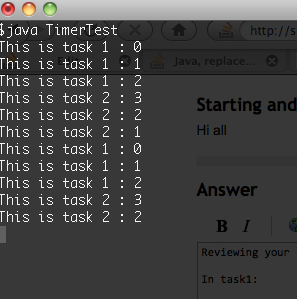I have one simple question regarding Java TimerTask. How do I pause/resume two TimerTask tasks based on a certain condition? For example I have two timers that run between each other. When a certain condition has been met inside the task of first timer, the first timer stops and starts the second timer, and the same thing happens when a certain condition has been met inside the task of second timer. The class below shows exactly what I mean:
public class TimerTest {
Timer timer1;
Timer timer2;
volatile boolean a = false;
public TimerTest() {
timer1 = new Timer();
timer2 = new Timer();
}
public void runStart() {
timer1.scheduleAtFixedRate(new Task1(), 0, 1000);
}
class Task1 extends TimerTask {
public void run() {
System.out.println("Checking a");
a = SomeClass.getSomeStaticValue();
if (a) {
// Pause/stop timer1, start/resume timer2 for 5 seconds
timer2.schedule(new Task2(), 5000);
}
}
}
class Task2 extends TimerTask{
public void run() {
System.out.println("Checking a");
a = SomeClass.getSomeStaticValue();
if (!a) {
// Pause/stop timer2, back to timer1
timer1.scheduleAtFixedRate(new Task1(), 0, 1000);
}
// Do something...
}
}
public static void main(String args[]) {
TimerTest tt = new TimerTest();
tt.runStart();
}
}
So my question is, how do I pause timer1 while running timer2 and vice versa while timer2 is running? Performance and timing is my main concern as this needs to be implemented inside another running thread. By the way I am trying to implement these concurrent timers on Android.
Thanks for your help!


java.util.concurrent.Timeris considered a bit old school. – PredictionThread.sleep(milliseconds)? – Wystandtimer1checksafor every second and ifais true, thentimer2starts performing something for 5 seconds, stops and continue checkingafor every second. – Wystand